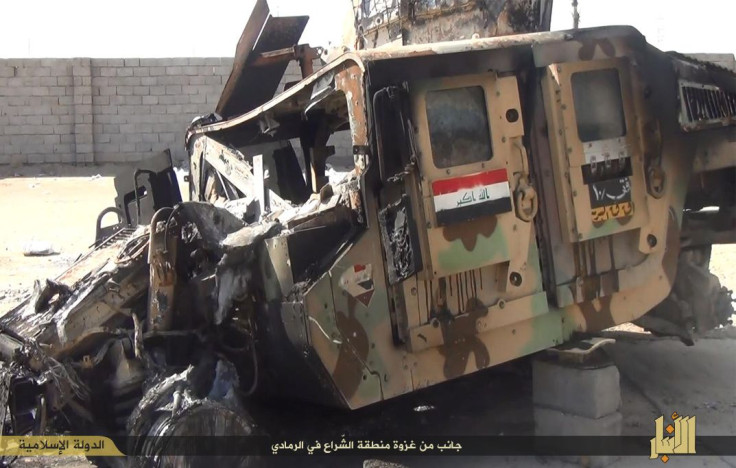ISIS Battle For Baghdad: Triple Car Bombs In Baghdad Could Mean ISIS Battle For Iraqi Capital Is Near

Three car bombs exploded in Shiite areas of Baghdad Saturday, killing at least 30 people and injuring more than 50, the Associated Press reported. The death toll is expected to rise. Baghdad has been experiencing a surge in bombings as the Islamic State group makes territorial gains in the Anbar province and threatens to seize the Iraqi capital. RT News reported a claim the militants are only 8 miles outside the city.
Two car bombs exploded at Iraqi-run checkpoints in the northern district of Khazimiyah and in Shula, less than a half-hour drive from Baghdad’s Green Zone. A third exploded on a busy commercial street lined with shops and civilian cars, AP said. Nobody has yet claimed responsibility for the attacks.
Just 17 miles from Baghdad’s center between the towns of Tarmiyah and Mishahda Saturday, a suicide bomber detonated his explosives belt in a marketplace, killing at least 11 people, including women and children, and injuring at least 20.
The attacks in Baghdad Saturday could foreshadow a larger operation by Sunni extremists in the militant group formerly known as ISIS.
The Islamic State group already has seized about 80 percent of Iraq’s largely Sunni northern province of Anbar. ISIS capitalized on Sunni tribal mistrust of Iraqi forces and Shiite militias to set up its stronghold in Iraq, and its forces have since surrounded the province’s capital Ramadi.
Some Sunni tribal leaders have called for help in Anbar from U.S. ground forces and Iraqi forces. Anbar leaders claimed the Islamic State group has brought in about 10,000 fighters from Syria, CNN reported. The exact number is unconfirmed, but territorial gains in Anbar did enable the militants to secure a supply route going from their base in Syria to central Iraq. ISIS has been bringing in fighters and weapons using the route, in what many have speculated to be preparations for an attack on Baghdad.
U.S. President Barack Obama’s administration said the participation of Sunni tribes is essential in the fight against the Islamic State group, but, as reported by the Washington Post, many tribes have refused to join because of their past tumultuous relationships with Iraqi forces and government-aligned Shiite militias. However, ISIS has made such big gains and threatened some of Iraq’s most important resources, like the Haditha Dam, that some tribal fighters have helped push militants back.
“Everybody knows that Anbar is the main incubator of ISIS, and it is expanding to Iraq’s other regions from here,” Anbar Tribal Council member Faris Ibrahim told Asharq Al-Awsat Friday. “Therefore ignoring Anbar has led to disaster, as we are seeing today.”
© Copyright IBTimes 2024. All rights reserved.






















